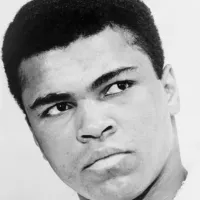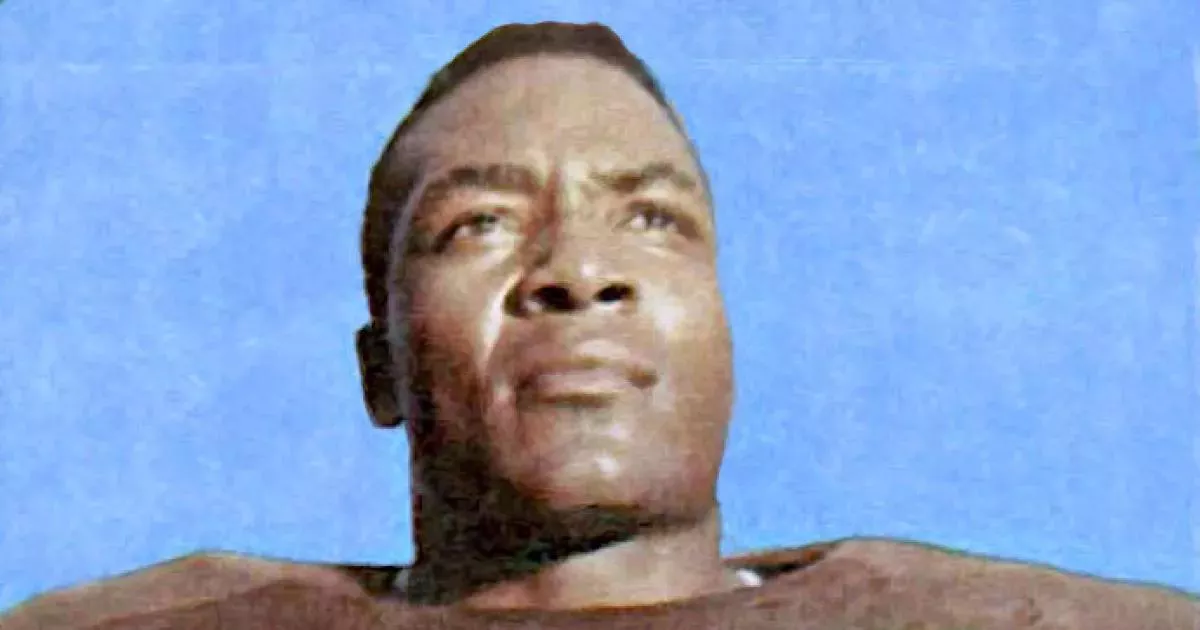Jim Brown was a dominant NFL running back for the Cleveland Browns (1957-1965). Widely regarded as one of the greatest football players ever, he earned Pro Bowl and All-Pro honors every season, won three AP NFL MVP awards and led the league in rushing yards eight times. Brown led the Browns to an NFL championship in 1964 and retired holding most major rushing records. Beyond football, he was also known as a civil rights activist and actor.
February 17, 1936: Jim Brown's Birth
On February 17, 1936, James Nathaniel Brown was born. He would become a celebrated American professional football player, civil rights activist, and actor.
1949: Previous Rushing Record
In 1949, Steve Van Buren set the previous NFL rushing record with 1,146 yards, which was broken by Jim Brown in 1958.
1953: Freshman Year at Syracuse
In 1953, Jim Brown was the only African-American player on the football team at Syracuse University as a freshman.
1955: Fifth Place in National Championship Decathlon
In 1955, Jim Brown finished in fifth place in the National Championship decathlon, showcasing his athletic versatility.
1956: All-American Honors at Syracuse
In 1956, during his senior year, Jim Brown was a consensus first-team All-American at Syracuse University. He also finished fifth in the Heisman Trophy voting.
1957: NFL Runners-Up
During Jim Brown's rookie season in 1957, the Cleveland Browns were NFL runners-up.
1957: Joined Cleveland Browns
In 1957, Jim Brown started his professional football career by joining the Cleveland Browns of the National Football League (NFL).
1958: Broke Single-Season Rushing Record
In 1958, Jim Brown broke the single-season rushing record with 1,527 yards and was named MVP.
1958: Led League in All-Purpose Yards
In 1958, Jim Brown led the league in all-purpose yards.
September 1959: Married Sue Brown
In September 1959, Jim Brown married Sue Brown (née Jones).
1960: Foreshadowed Early Retirement
As early as 1960, Jim Brown, at 24 years old, expressed concerns about the physical toll of football and foreshadowed an early retirement, aiming to leave the game while still at his peak.
1960: Birth of Twins
In 1960, Jim Brown and Sue Brown had twins.
1961: Led League in All-Purpose Yards
In 1961, Jim Brown led the league in all-purpose yards.
1962: Birth of Son
In 1962, Jim Brown and Sue Brown had a son.
1963: Single-Season Rushing Record
In 1963, Jim Brown set the single-season rushing record with 1,863 yards.
1963: Cleveland Browns Franchise Record
Jim Brown's 1,863 rushing yards in the 1963 season remains a Cleveland franchise record.
1964: Acting Career Begins
Before the 1964 season, Jim Brown began his acting career, playing a buffalo soldier in the Western action film 'Rio Conchos'.
1964: Led League in All-Purpose Yards
In 1964, Jim Brown led the league in all-purpose yards.
1964: NFL Championship with the Browns
In 1964, Jim Brown won an NFL championship as a player for the Cleveland Browns.
1965: Final Season with Cleveland Browns
1965 marked Jim Brown's final season playing fullback for the Cleveland Browns in the NFL.
1965: NFL Runners-Up
During Jim Brown's final season in 1965, the Cleveland Browns were NFL runners-up.
1965: First Black Televised Boxing Announcer
In 1965, Jim Brown became the first black televised boxing announcer when he announced the Terrell–Chuvalo fight in the United States. He also suggested a boxing career to Bob Arum.
1965: Arrested for Assault and Battery
In 1965, Jim Brown was arrested in his hotel room for assault and battery against 18-year-old Brenda Ayres. He was later acquitted of those charges.
1965: Third MVP Award
In 1965, Jim Brown won his third league MVP award.
1965: Retired from NFL
Jim Brown retired from the NFL in 1965, holding the record for yards-per-carry by a running back until 2012.
July 1966: Retired from the NFL
In July 1966, Jim Brown retired from the NFL at age 30, while filming 'The Dirty Dozen' in England.
1966: Founded the Negro Industrial Economic Union
In 1966, Jim Brown founded the Negro Industrial Economic Union, later known as the Black Economic Union (BEU), to promote economic opportunities for minority-owned businesses. The BEU secured loans and grants to support community initiatives.
1966: Filming 'The Dirty Dozen'
In early 1966, Jim Brown was filming 'The Dirty Dozen' in London, which led to a dispute with the Cleveland Browns owner and ultimately his retirement from football.
1967: Cleveland Summit Meeting
In 1967, Jim Brown participated in the Cleveland Summit with Muhammad Ali, Bill Russell, Kareem Abdul-Jabbar, and Carl Stokes, to support Ali's civil rights stance and opposition to the Vietnam War. This put their reputations and careers at risk but was a "significant turning point for the role of the athlete in society".
1968: Jim Brown's Interview with Ebony Magazine
In 1968, Jim Brown stated in an interview with Ebony Magazine about the importance of establishing industries and commercial enterprises to create a sustainable economic base for the African American community.
1968: First Lead Role in 'The Split'
In 1968, Jim Brown was cast in his first lead role in 'The Split', and also starred in 'Ice Station Zebra'.
1968: Charged with Assault with Intent to Commit Murder
In 1968, Jim Brown was charged with assault with intent to commit murder after model Eva Bohn-Chin was found beneath the balcony of his apartment. The charges were later dismissed, but Brown was fined for striking a deputy sheriff.
1968: Sue Brown Sued for Divorce
In 1968, Sue Brown sued Jim Brown for divorce, charging him with "gross neglect".
1969: Starred in 100 Rifles
In 1969, Jim Brown starred in '100 Rifles' and had a love scene with Raquel Welch, marking one of the first interracial love scenes in a major Hollywood movie.
1969: Road-Rage Incident
In 1969, Jim Brown was involved in a road-rage incident that led to assault and battery charges.
1969: Cinematic History with 100 Rifles
In 1969, Jim Brown's role in the film '100 Rifles' marked cinematic history by featuring interracial love scenes.
1970: Found Not Guilty of Assault and Battery
In 1970, Jim Brown was found not guilty of assault and battery related to a road-rage incident from 1969.
1971: Enshrinement in Pro Football Hall of Fame
In 1971, Jim Brown was enshrined in the Pro Football Hall of Fame.
1972: Divorce Finalized
In 1972, Jim Brown's divorce from Sue Brown was finalized.
1973: O.J. Simpson Season
O. J. Simpson's 1973 season is the only season that exceeded Jim Brown's average of 133 yards per game in 1963.
September 1974: Posed Nude for Playgirl
In September 1974, Jim Brown posed in the nude for Playgirl magazine, being one of the rare celebrities to allow full-frontal nude pictures to be used.
1974: Engagement Broken Off
In 1974, Jim Brown and Diane Stanley broke off their engagement.
1974: Starred in 'Three the Hard Way'
In 1974, Jim Brown starred with Fred Williamson and Jim Kelly in 'Three the Hard Way'.
1975: Convicted of Misdemeanor Battery
In 1975, Jim Brown was convicted of misdemeanor battery for beating and choking his golfing partner, Frank Snow. He was sentenced to one day in jail, two years' probation, and a fine.
1978: Worked as Color Analyst for CBS
In 1978, Jim Brown worked as a color analyst on NFL telecasts for CBS, teaming with Vin Scully and George Allen.
1978: NFL Season Expansion
In 1978, the NFL season expanded to 16 games.
1982: Appearance in One Down, Two to Go
In 1982, Jim Brown appeared with Fred Williamson, Jim Kelly, and Richard Roundtree in 'One Down, Two to Go'.
1983: Mused About Comeback
In 1983, 17 years after retiring, Jim Brown considered coming out of retirement to play for the Los Angeles Raiders because he disliked Franco Harris' running style, however he ultimately didn't return to football.
1983: Inducted into National Lacrosse Hall of Fame
In 1983, Jim Brown was inducted into the National Lacrosse Hall of Fame.
October 7, 1984: Payton Breaks Rushing Record
On October 7, 1984, Walter Payton broke Jim Brown's NFL career rushing record during his 10th NFL season.
1985: Charged with Rape
In 1985, Jim Brown was charged with raping a 33-year-old woman, but the charges were later dismissed.
1986: Arrested for Assaulting Fiancée
In 1986, Jim Brown was arrested for assaulting his fiancée Debra Clark, who refused to press charges, leading to his release.
1987: Acted in 'The Running Man'
In 1987, Jim Brown appeared opposite Arnold Schwarzenegger in 'The Running Man', playing the character Fireball.
1988: Founded the Amer-I-Can Foundation
In 1988, Jim Brown founded the Amer-I-Can Foundation, which aimed to divert gang members and prisoners from violence by teaching them life skills. He also helped establish the Watts truce between rival street gangs in Los Angeles.
1988: Cameo in 'I'm Gonna Git You Sucka'
In 1988, Jim Brown had a cameo in the spoof 'I'm Gonna Git You Sucka'.
1989: Published Autobiography "Out of Bounds"
In 1989, Jim Brown's autobiography, titled "Out of Bounds" and co-written with Steve Delsohn, was published by Zebra Books.
1993: Color Commentator for UFC
In 1993, Jim Brown was hired as a color commentator for the Ultimate Fighting Championship.
1995: Induction into College Football Hall of Fame
In 1995, Jim Brown was inducted into the College Football Hall of Fame, cementing his legacy as an all-time great college player from Syracuse University.
1996: Appeared in Original Gangstas and Mars Attacks!
In 1996, Jim Brown appeared in 'Original Gangstas' and 'Mars Attacks!'.
1997: Married Monique
In 1997, Jim Brown married his second wife, Monique.
1999: Ranked Among Greatest Athletes
In 1999, ESPN's SportsCentury ranked Jim Brown fourth among their 50 Greatest Athletes of the 20th Century.
1999: Played Montezuma Monroe in Any Given Sunday
In 1999, Jim Brown played a defensive coach, Montezuma Monroe, in 'Any Given Sunday'.
1999: Arrested for Terroristic Threats
In 1999, Jim Brown was arrested and charged with making terroristic threats toward his wife Monique. He was later found guilty of vandalism.
2000: Sentenced for Vandalism
In 2000, Jim Brown was sentenced to three years' probation and other requirements for vandalizing his wife's car. He ignored the terms of his sentence.
2002: Jailed for Violating Probation
In 2002, Jim Brown began serving a six-month jail sentence for refusing to comply with court-ordered counseling and community service.
2002: Greatest Player Ever
In 2002, The Sporting News named Jim Brown as the greatest professional football player ever.
2002: Named Greatest Football Player
In 2002, The Sporting News selected Jim Brown as the greatest football player of all time.
2003: FBI Files Declassified
In 2003, files were declassified showing that the FBI, the United States Secret Service, and several police departments had monitored Jim Brown and the Black Economic Union, attempting to smear the group.
2004: Appeared in Sucker Free City
In 2004, Jim Brown appeared in 'Sucker Free City'.
2006: Tomlinson Breaks Touchdown Record
In 2006, LaDainian Tomlinson broke Jim Brown's record of scoring 100 touchdowns in the fewest games.
2008: Lawsuit Against Sony and EA Sports
In 2008, Jim Brown initiated a lawsuit against Sony and EA Sports for using his likeness in the Madden NFL video game series.
2008: Portrayed in The Express
In 2008, Jim Brown was played by Darrin Dewitt Henson in the sports drama "The Express: The Ernie Davis Story".
2010: Ranked Second-Greatest NFL Player
On November 4, 2010, Jim Brown was chosen as the second-greatest player in NFL history by NFL Network's NFL Films production "The Top 100: NFL's Greatest Players".
2012: Yards-per-Carry Record Broken
In 2012, Jamaal Charles broke Jim Brown's yards-per-carry record, which Brown had held since his retirement in 1965.
2012: Part-Owner of New York Lizards
In 2012, Jim Brown became a part-owner of the New York Lizards of Major League Lacrosse, joining a group of investors in the purchase of the team.
May 29, 2013: Named Special Advisor to the Browns
On May 29, 2013, Jim Brown was named a special advisor to the Cleveland Browns.
2013: Portrayed in One Night in Miami (Play)
In 2013, Jim Brown was portrayed by David Ajala in the London cast of the play "One Night in Miami".
2014: Named Greatest Football Player by New York Daily News
In 2014, The New York Daily News selected Jim Brown as the greatest football player of all time.
2015: Statement on Violence
In 2015, Jim Brown stated that "There is no excuse for violence" and that men should never put their hands on a woman, regardless of the situation.
October 11, 2018: Met with President Donald Trump
On October 11, 2018, Jim Brown, along with Kanye West, met with President Donald Trump to discuss the state of America. This meeting was criticized by the black community.
2018: Ranked 11th All-Time Leading Rusher
As of 2018, Jim Brown ranked 11th on the all-time rushing list in the NFL.
November 2019: Selected for NFL 100th Anniversary All-Time Team
In November 2019, Jim Brown was selected as one of the twelve running backs on the NFL 100th Anniversary All-Time Team.
January 13, 2020: Named Greatest College Football Player of All Time
On January 13, 2020, Jim Brown was named the greatest college football player of all time by ESPN.
2020: Greatest College Football Player of All Time
In 2020, Jim Brown was honored as the greatest college football player of all time at the College Football Playoff National Championship.
2021: Portrayed in One Night in Miami (Film)
In 2021, Jim Brown was portrayed by Aldis Hodge in the film adaptation of "One Night in Miami".
2021: NFL Season Expands to 17 Games
In 2021, the NFL season expanded to 17 games.
2022: Accusations in 'Secrets of Playboy' Documentary
In 2022, according to victims and witnesses interviewed for the documentary series "Secrets of Playboy", Jim Brown was accused of brutally raping and assaulting numerous women at the Playboy Mansion from the late 1970s into the 1990s.
May 18, 2023: Jim Brown's Death
On May 18, 2023, Jim Brown passed away. He was known as an American professional football player, civil rights activist, and actor.
2023: Equivalent Fine
In 1966, Art Modell threatened to fine Brown $1,500 for every week of camp he missed, equivalent to $14,100 in 2023.
Mentioned in this timeline

Donald John Trump is an American politician media personality and...

Arnold Schwarzenegger is an Austrian-American actor businessman former politician and...

Kanye West professionally known as Ye is a highly influential...

Bill Russell was a dominant American professional basketball player primarily...

Muhammad Ali nicknamed The Greatest was an iconic American professional...
CBS Broadcasting Inc CBS is a prominent American commercial broadcast...
Trending

48 minutes ago The Highwomen Return: Carlile, Crow, Judd, and Spencer Reunite for Canyon Performances.

48 minutes ago Raphael Veiga's game impresses fans; Adapts to Mexico after leaving Palmeiras.
48 minutes ago Jalen Williams Injury Scare: Thunder Re-evaluating Hamstring After All-Star Break
3 months ago Titanic Passenger's Gold Pocket Watch Anticipated to Break Auction Records, Selling for Millions.

49 minutes ago Armando 'Hormiga' González's Goal and Missed Opportunity in Chivas vs. América Clash

2 hours ago Jacob Elordi's 'Wuthering Heights' film sparks debate with cringe press tour and changed ending.
Popular

Kid Rock born Robert James Ritchie is an American musician...

Pam Bondi is an American attorney lobbyist and politician currently...
Randall Adam Fine is an American politician a Republican who...

Barack Obama the th U S President - was the...
The Winter Olympic Games a major international multi-sport event held...

XXXTentacion born Jahseh Dwayne Ricardo Onfroy was a controversial yet...
